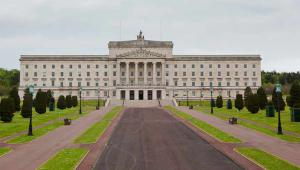“Peter will not marry Paul in Northern Ireland.” This tweet from the Democratic Unionist Party’s former health minister Jim Wells reflects the social conservatism of the party that looks likely to support Theresa May in government. The DUP used its veto in the Stormont Assembly to block gay marriage. According to former Scottish communities minister Marco Biagi, it also tried to stop Northern Irish citizens obtaining same-sex marriages in Scotland.
The DUP is equally hard line on abortion, which is almost completely banned in Northern Ireland. Proposed amendments to the law to allow abortion when the foetus cannot survive or in the case of rape or incest were successfully opposed by the DUP. The party is close to a fundamentalist Protestant group the Caleb Foundation – former finance minister Mervyn Storey is vice chair – that insists the world was created 6,000 years ago.
This linkage between politics and religion is no accident and is central to the character of the DUP. The party was founded in 1971 by Ian Paisley, who founded the Free Presbyterian Church 20 years earlier. There is still a strong overlap of membership, though the DUP attracts support from within other Protestant churches, including Methodism and the Church of Ireland. Many – perhaps most – of its male members also belong to the Orange Order and other loyal orders (hence the word loyalism).
The DUP’s rise followed its opposition to the 1998 Good Friday Agreement, signed by David Trimble for the Ulster Unionist Party. Paisley was determined to destroy the UUP – a task the DUP largely achieved in the latest general election, with no MPs left now to represent traditional, patrician, unionism. The St Andrews Agreement of 2006 gave Paisley and the DUP sufficient cover to enter power sharing and devolved government. St Andrews was little different to the GFA, but was supposed to stop ministers acting unilaterally.
Just three people have led the DUP – Paisley, Peter Robinson and, currently, Arlene Foster – and each has been Northern Ireland’s first minister. All have demonstrated an astonishing capacity to survive scandals. Paisley was repeatedly accused of inspiring loyalist paramilitaries. Robinson stood down for a period when first minister while property dealings involving his wife and her lover were investigated and found innocent of any wrongdoing. He also survived unscathed from suggestions that Red Sky, which maintained government housing stock, had won contracts after supporting the DUP.
Then there was Project Eagle – the sale of a vast portfolio of Northern Ireland bank loans that had a nominal value of £4.5bn, but was sold by Ireland’s Nama for just £1.2bn. DUP ministers insisted they were not involved in any impropriety, despite allegations in the Irish Dail that northern politicians had intervened for personal benefit. But it was the maladministration of the Renewal Heat Incentive scheme set-up while Arlene Foster was enterprise minister that caused the collapse of the Assembly. An inquiry is to establish the cause of the ‘cash for ash’ fiasco that will cost around half a billion pounds. Another problem for the DUP has been its support for Charter NI, which is closely associated with a paramilitary organisation, the Ulster Defence Association. The UDA endorsed the DUP at the general election – an endorsement the DUP said it had not sought.
Prior to the 2015 election, the DUP spelt out its terms for support for a minority government. These included extra money for schools and hospitals in NI and a cut to the province’s corporation tax rate to attract more inward investment. It also called for “proper border controls and a tougher immigration policy”. A key demand to government now may be the ruling out of prosecutions of former service personnel in relation to deaths during the Troubles.
In its latest general election manifesto, the DUP stressed the importance of strong ties between Northern Ireland and Great Britain. The DUP’s position on Brexit is that there must be no border between Northern Ireland and Great Britain; a frictionless border between the north and south of Ireland; and customs arrangements that facilitate trade with both new and existing markets.
The big question is whether these apparently contradictory demands can be reconciled. During the Brexit referendum campaign, Boris Johnson talked in favour of having his cake and eating it. That sounds very similar to the DUP’s position today.


















